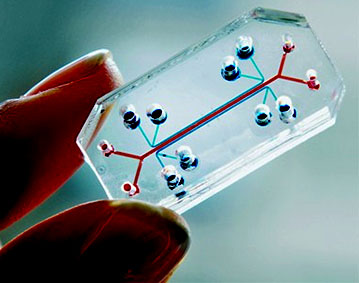Donald
Ingber (Wyss Institute Biological Engineering at
Harvard) being frustrated with animal model in clinical
research set out to create in vitro models using
processes to manufacture computer microchips, which
could maintain a surface topology at nanometer
resolution. The chips have hollow channels
the size of a cell and using microfluidics
would allow one to manipulate processes at a cellular
level.
In 2005 they were able to to create channels small
enough to simulate a small lung
airway that, when liquids flowed through the
channels, recreated fluid sounds akin to a physicians
stethoscope. (a Lung-on-a-Chip).
